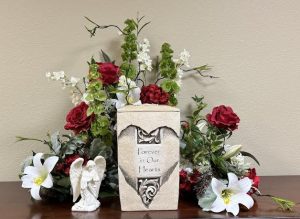 Recently, a customer told me matter-of-factly: “When I die, I don’t want a funeral.”
Recently, a customer told me matter-of-factly: “When I die, I don’t want a funeral.”
My first thought was “Ouch. Where does that leave your family?”
I reached out to an expert, Eric Stadler, Pre-planning Specialist at Valley Funeral Home. I asked what his response would be.
Stadler replied, “When you say, “I don’t want a funeral”, what does that mean to you?”
The answer might be, “Well, I don’t need ‘all that’.
Stadler would ask, “What is ‘all that’?”
They might mean the open casket, or the church, or the fuss.
On the other hand, they might mean they don’t want to put their loved ones through those sad moments.
He said, “Let’s take out your modesty, for a minute.”
You might think, “I didn’t do anything special.” It’s hard for us as individuals to admit that we want people to honor us and respect the life that we lived.”
“Your family members deserve to be comforted, because that is who’s missing out if there is no funeral.”
“Having a funeral gives us the opportunity to come together with family and friends so we can be supported, and loved, and guided, and coddled, and just allowed to cry and get it all out.”
Reflecting, Stadler said, “My grandmother passed away when she was 91 years old. During the visitation, an old friend of our family came walking in. I was so surprised to see her and said, “What are you doing here?”
She replied, “I knew this was going to be one of the hardest days of your life, and I wanted to be here for you.”
“Every survivor deserves to be reminded how others love and support them. It is a chance for friends to say, “I care about you.”
“We, as the people who are grieving, also need to know that our loved one meant something to other people, not just to us. When someone comes through a receiving line and shares a quick story, it is invaluable.”
Stadler further explained the value of having something at a public place with its own designated time: at a funeral home or a church, it is a neutral zone. “It is a fair way to say anybody is welcome to stop in. You don’t get that with a private gathering.”
“If there isn’t a designated time and place for folks to be consoled, it still happens, but where? It will be at the grocery store or at the post office. Somewhere that you run into people, in a public place, unprepared. You end up having multiple funerals.”
He said, “No one who has ever had a funeral, a celebration of life, a gathering at a funeral home or at a church, and has ever come back and said, “I wish we wouldn’t have done that.” It is a healing time. It is a beautiful feeling to be supported, to be thought of and to be loved.”
“This is about you, but it isn’t for you. By having a celebration of your life, you’re giving your family something very special.”
We live on in the memory of others.
